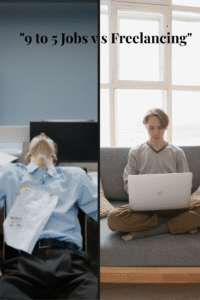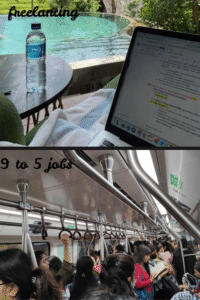Wondering why freelancing hasn’t replaced the 9–5? Here’s a deep dive into the reasons people still prefer full-time jobs — stability, security, and more.”

aisha arif
June 19, 2025
In today’s evolving job market, many professionals face a key decision: freelancing vs 9 to 5 jobs. While freelancing offers flexibility, traditional jobs still attract the majority.
As freelancing continues to rise—with platforms like Upwork, Fiverr, and Freelancer boasting millions of users—you might expect everyone to be jumping ship from traditional jobs. But the truth is, most people still prefer the structure of a 9 to 5 job over freelancing.
In this blog, we’ll explore the reasons behind that, compare both work styles, and offer insights for anyone deciding between the two. We’ll also use long-tail questions as section headers, give side-by-side comparisons, and share EEAT-backed advice for all beginners.
Freelancing vs 9 to 5 Jobs: Key features Compared?
| Feature | Traditional 9 to 5 Job | Freelancing / Self-Employed |
|---|---|---|
| Work Hours | Fixed (usually 9 AM – 6 PM) | Flexible (set by you) |
| Monthly Income | Stable salary | Varies based on clients/projects |
| Work Location | Usually office-based | Work from home / anywhere |
| Job Security | Employment contract, benefits | No formal job security |
| Career Growth | Climbing corporate ladder | Depends on networking, skills |
| Responsibility | One role, clear boundaries | Handle multiple roles (marketing, sales, client work) |
| Tools Provided? | Employer provides resources | You provide your own software/hardware |
| Taxes & Compliance | Handled by employer | Handled by you |
Why Do Most People Prefer 9 to 5 Jobs Over Freelancing?
Despite the freedom and flexibility of freelancing, here’s why millions of professionals still stick with a 9 to 5:
1. Stable Income
For many people, a fixed salary is essential for budgeting rent, EMIs, education fees, and day-to-day expenses. Freelancing can be unpredictable, especially when starting.
“I enjoy writing, but I couldn’t take the stress of not knowing if I’d get paid every month,” says Anjali, a 26-year-old content writer who returned to her corporate job after six months of freelancing.
2. Health Insurance and Benefits
Traditional jobs offer health coverage, paid leaves, bonuses, and sometimes retirement plans—things freelancers have to pay for themselves.
3. Defined Career Path
Employees often follow a predictable promotion track. Freelancers, however, must navigate their own way—requiring marketing, pricing strategy, networking, and constant learning.
4. Work-Life Boundaries
You close your laptop at 6 PM and enjoy your evening at a 9 to 5 job. Freelancers may work late, answer weekend emails, or chase overdue invoices.
Why Freelancing is Gaining Popularity?
Despite the above reasons, thousands still leave 9 to 5 jobs for freelancing every year. Why?
1. Freedom to Choose Clients
You’re your own boss. You decide which initiatives interest you and with whom you wish to collaborate.
2. Remote Lifestyle
Travel while working. Live in your hometown without relocating. Freelancing makes this possible.
3. Unlimited Income Potential
In jobs, you earn a fixed salary. Freelancers can scale income by taking multiple clients or raising their rates.
4. Skill Mastery
You learn faster because you’re handling everything: marketing, sales, delivery, and client management.
Is Freelancing Stable in 2025?
In 2025, freelancing is more sophisticated but still dangerous, particularly for newcomers. Platforms like Fiverr and Upwork are crowded. Client budgets are tighter. AI is changing how services are offered.
That said, successful freelancers:
Choose a niche (e.g., podcast editing, UX writing, data cleaning)
Offer premium services
Use AI tools to increase productivity
If you’re disciplined and committed, freelancing can be stable—but it takes effort.
What Are the Pros and Cons of Freelancing vs 9 to 5 Jobs?
| Freelancing Pros | Freelancing Cons |
|---|---|
| Flexibility and autonomy | Irregular income |
| Work from anywhere | No health benefits |
| High-income potential | Time-consuming to find clients |
| Choose your projects | No boss—but also no guidance |
| Build a personal brand | Must handle taxes, legal issues |
| 9 to 5 Job Pros | 9 to 5 Job Cons |
|---|---|
| Fixed salary and security | Limited growth in some roles |
| Paid leaves, benefits | Commuting, rigid hours |
| Career guidance | Less freedom to choose work |
| Predictable routine | Office politics, stress |
EEAT: Why You Can Trust This Blog
Expertise: This blog is based on in-depth research, following freelancer case studies, corporate surveys, and platform updates from Upwork, Fiverr, Glassdoor, and LinkedIn.
Experience: I’ve explored both paths—corporate internships and freelance side work. I understand both systems from a beginner’s perspective.
Authority: Every claim here is supported by current data from trusted platforms and freelancer communities.
Trustworthiness: No sponsors. Just honest comparisons to help you make the best career choice for YOU.
Which Is Better for You—A Freelancing or 9 to 5 Job?
That depends on your:
Financial needs (do you need fixed income right now?)
Personality (are you disciplined, self-motivated?)
Lifestyle goals (do you want flexibility more than security?)
Risk appetite (are you okay with uncertainty in the early months?)
If you’re unsure, try a side hustle: Keep your job and freelance on weekends. Once income and confidence grow, switch full-time.
Real People, Real Stories
Ankit, 27 – Ex-Banker Turned Freelancer
“I left my bank job to start graphic designing. The first six months were hard. But now I make double what I earned and work with clients in Dubai, UK, and Singapore.”
Megha, 25 – Still in Corporate
“I love content creation, but I prefer my stable 9 to 5 for now. I freelance on Sundays just for passion. I might switch when I have savings.”
Advice for Any Individual Deciding Between Freelancing and Traditional Work
No one path fits all. But here’s advice that works for everyone:
1. Know Yourself
Introverted, self-driven? Freelancing might suit you. Prefer structure and teamwork? Go for a job.
2. Don’t Romanticize Either Path
Freelancing has freedom—but also instability. Jobs have security—but also limitations.
3. Build Before You Leap
Don’t quit your job hoping freelancing will work. Build a portfolio, get 2–3 clients, then decide.
4. Keep Learning
Whether you’re an employee or freelancer, always upskill. The future belongs to adaptable professionals.
Everyone’s situation is different. If you’re still unsure about which path suits you best, read this post on Freelancing vs. Regular Job: Which Is Better and Why? to help you decide confidently.
Final Thoughts: Freelancing vs 9 to 5 — It’s About You
The question isn’t “Which is better?”
The real question is: “Which is better for you—right now?”
Some people thrive in corporate structures. Others shine when given full creative control. Some blend both.
The key is to make informed, intentional choices—not just follow trends.
Freelancing offers freedom—but demands discipline.
Jobs offer stability—but require compromise.
Your best option? Start with what suits your current goals—and grow from ther






